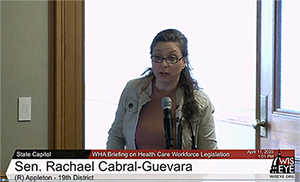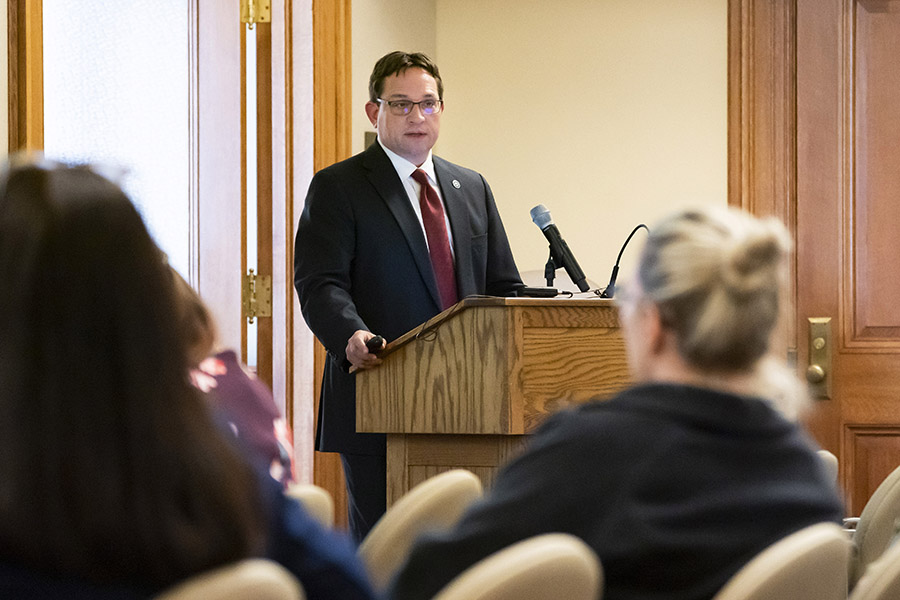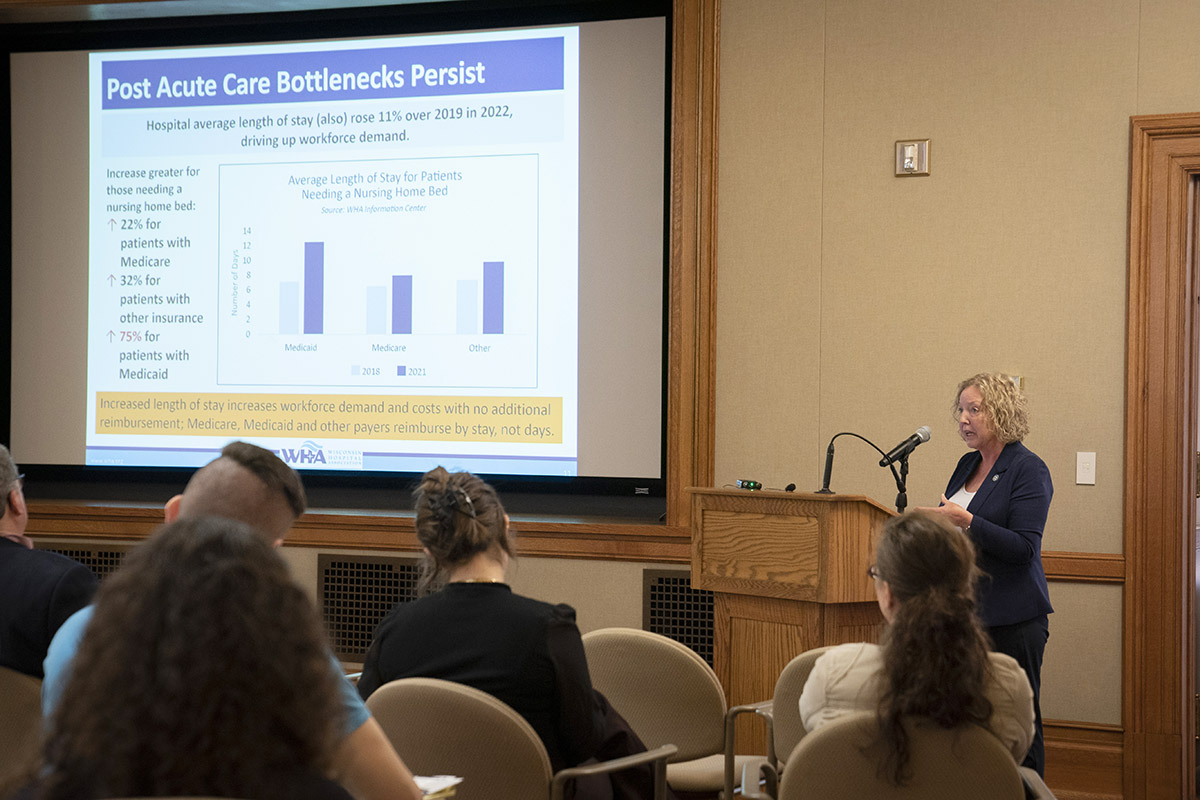The chairs and ranking members of the Wisconsin Legislature’s Senate Committee on Health and the Assembly Committee on Health, Aging & Long-Term Care hosted a Wisconsin Hospital Association (WHA) workforce legislative briefing for state policymakers and staff April 11, 2023, at the state capitol in Madison, and streamed live on WisconsinEye. The legislative briefing shared findings and recommendations from WHA’s recently released
2023 Wisconsin Health Care Workforce Report.

State Sens. Rachael Cabral-Guevara and Dianne Hesselbein and state Reps. Clint Moses and Lisa Subeck invited state legislators and legislative staff to join them at the state capitol as Senate Committee on Health Chair Sen. Cabral-Guevara, WHA President and CEO Eric Borgerding, and WHA Senior Vice President of Workforce and Clinical Practice Ann Zenk shared how sound health care policy strengthens the health care workforce and assists policymakers in addressing current and future health care workforce needs. More than 100 legislators and staff were in the audience or tuned in via the
WisconsinEye stream.
Cabral-Guevara opened the briefing, noting “The health care workforce is very complex, depending on many different levels of training. It’s multi-faceted—CNAs all the way up to advanced practice clinicians.” Cabral-Guevara encouraged her colleagues to partner to address the issue. “It doesn’t matter what district you’re in; this is something everybody is struggling with here in the state of Wisconsin, and it’s something we worked on last session, and we’ll be working on again.”
 Eric Borgerding
Eric Borgerding
Borgerding provided an overview of the environment and challenges confronting Wisconsin hospitals and health systems and their workforce. He noted that WHA’s annual workforce report drives workforce policy solutions. “This report has been a catalyst for public policy, for reforms and changes to how we license, regulate and educate our health care workforce,” Borgerding said.
Borgerding recognized the value of the Legislature’s much-appreciated partnership in key workforce policy, such as the licensure reform enacted by
2021 Wisconsin Act 10, and the public-private partnerships created by
Grow Our Own grants created
by 2013 Act 20 and
2017 Act 57.
“When it comes to our workforce, we have to continue to be partners, to look for every solution, including how we can work together to attract people into a health care profession or career,” said Borgerding.
Zenk shared trends and data from WHA’s workforce report and explained how the pandemic exacerbated and brought to the forefront pre-existing issues, such as surges of retirements as members of the baby boom generation reached age 65; post-acute care bottlenecks; and a nursing shortage in Wisconsin for the first time in over a decade. She noted, “COVID may be receding, but the issues it brought to the forefront persist.” Zenk explained how demographics and the “Silver Tsunami” (the aging of the very large baby boom generation) are simultaneously increasing health care demand and shrinking the available workforce.
 Ann Zenk presenting at the WHA workforce legislative briefing April 11, 2023.
Ann Zenk presenting at the WHA workforce legislative briefing April 11, 2023.
“We’ve been saying in our workforce reports these past few years that the health care workforce can’t grow fast enough to keep pace with the ‘Silver Tsunami,’ and the doubling of the overall vacancy rate in just one year demonstrates that Wisconsin’s health care workforce is falling behind demand,” said Zenk.
Zenk noted health care does have an advantage over other industries. “Health care career pathways are visible and clearly defined, and often supported by employers through tuition support and flexible scheduling.”
Zenk provided examples from WHA’s 2023 report that highlighted the value health care employment offers to those on career pathways, noting, “Financial support is important, as is the ability to flex your work schedule while you’re going to school, but what really struck me in the stories included in this year’s report is how much learning beside a trusted co-worker adds to the education and training experience.” As one hospital employee noted in the WHA report, “Removing the financial barrier to learning was a huge help for me and being able to do my clinicals at St. Joe’s and within the Gundersen system helped me learn better with people I already had a working relationship with.”
Getting people into health care career pathways is vital, but just as important is to give them a good welcome to the Wisconsin health care workforce. Zenk discussed how lawmakers can continue the important licensure reform started with Wisconsin 2021 Act 10 by supporting the legislation recommended by the
Legislative Council Study Committee on Occupational Licensure on which Zenk served.
With the workforce already falling behind demand, though, Zenk utilized state and national data to illustrate that it is unlikely the health care workforce can grow fast enough and highlighted WHA’s recommendations to grow the workforce faster, to increase the capacity of the health care workforce through effectively utilizing teams and technology, and to relieve the workforce from unnecessary burden.
“We’ve done great work together, but there’s much more work to be done,” noted Zenk. “And I know we can do it together. We need and appreciate your partnership.”
Contact
Ann Zenk with questions or ideas regarding the health care workforce or WHA’s 2023 Wisconsin Health Care Workforce Report.